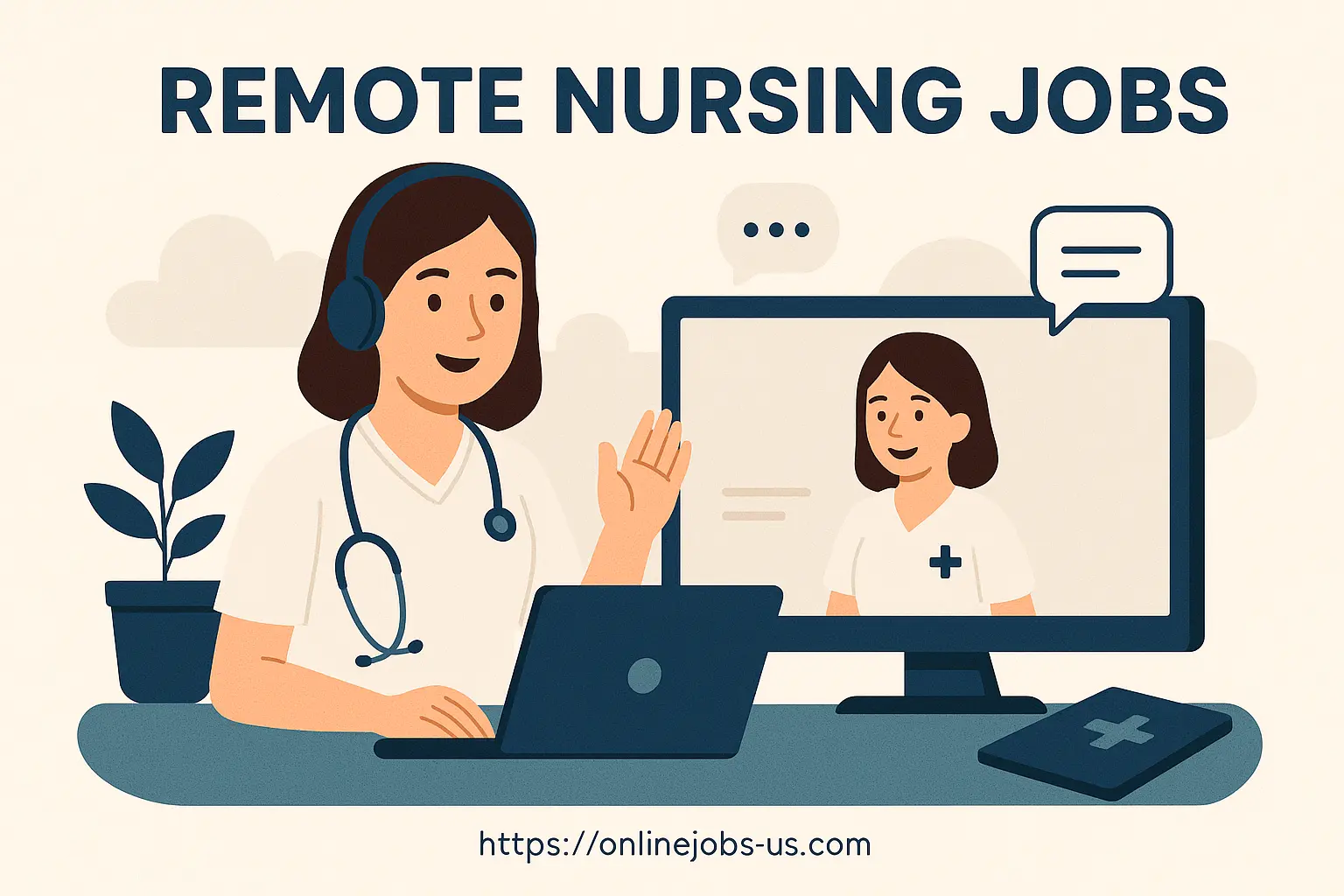Remote Nursing Jobs

In the ever-evolving landscape of healthcare, remote nursing jobs have emerged as a powerful career alternative for licensed nurses seeking flexibility, balance, and new opportunities beyond the traditional hospital setting. The surge in telemedicine, digital health platforms, and the global shift toward hybrid work environments have redefined what it means to be a nurse today.
This comprehensive career guide explores the world of remote nursing roles, from job types and where to apply to the pros, cons, and future trends shaping the industry. Whether you’re an experienced RN looking to transition or a new graduate considering your options, this guide provides actionable insights to help you succeed.
1. Understanding Remote Nursing
Remote nursing involves providing medical care, support, or coordination services away from a traditional clinical setting. Nurses in these roles work from home, using telecommunication tools to consult with patients, monitor conditions, manage healthcare data, or support healthcare systems virtually.
Key requirements for remote nursing jobs:
- Valid RN, BSN, or MSN licensure (state-specific or multi-state compact license)
- Clinical experience (typically 1–3 years)
- Strong communication and digital literacy
- Access to secure internet and a HIPAA-compliant environment
Remote nursing does not mean stepping away from patient care altogether. Instead, it adapts how care is delivered—making the role more efficient, tech-driven, and location-independent.
2. Types of Remote Nursing Roles
Remote nursing isn’t limited to one or two job titles. It spans a diverse set of roles across clinical, administrative, educational, and consulting fields.
a. Telehealth Nurse
A telehealth nurse communicates directly with patients via video calls or phone to assess symptoms, provide medical advice, and determine next steps. Common in urgent care, chronic illness management, and follow-ups.
Skills Needed: Triage experience, excellent communication, tech proficiency.
b. Case Management Nurse
Case managers coordinate care plans, track patient progress, and ensure treatment compliance—often for patients with chronic conditions, post-surgical care, or long-term recovery needs.
Ideal For: Nurses with organizational skills and experience in discharge planning or utilization review.
c. Triage Nurse
Triage nurses evaluate patient symptoms remotely and prioritize urgency. They often work for insurance companies, hospitals, or health call centers.
Must-Have: Ability to make fast, accurate assessments without physical examination.
d. Nurse Educator
Remote nurse educators provide online training and mentorship for nursing students or fellow professionals. Many work with universities, online course platforms, or continuing education providers.
Recommended: MSN or doctoral degree; prior teaching experience.
e. Clinical Research Nurse
These professionals assist in managing clinical trials, collecting data, and ensuring regulatory compliance—all from a remote setting.
Ideal Fit: Detail-oriented nurses with experience in documentation and research.
f. Utilization Review Nurse
Utilization review (UR) nurses evaluate medical treatments for necessity and efficiency, often working with insurance companies or hospitals.
Bonus: Familiarity with Medicare, Medicaid, and insurance policies.
g. Health Coach or Wellness Nurse
Focuses on preventive care, lifestyle changes, and chronic disease management. This role suits nurses with an interest in public health and coaching.
3. Platforms to Find Remote Nursing Jobs
To land a legitimate and well-paying remote nursing job, it’s essential to know where to look. Below are reputable platforms and employers offering remote roles in nursing:
✅ Healthcare-Specific Job Boards
- Relias – Focuses on remote clinical education and compliance roles.
- NurseFly – Lists travel and remote jobs tailored for RNs.
✅ General Remote Job Boards
- FlexJobs – A trusted platform that screens every job listing for scams.
- Remote.co – Offers remote nursing and healthcare positions globally.
- We Work Remotely – Occasionally features high-level RN or educator roles.
✅ Hospital and Health Systems
- UnitedHealth Group
- Ascension Health
- Kaiser Permanente
- Aetna / CVS Health
- Humana
These organizations frequently hire remote RNs, case managers, and telehealth professionals.
✅ Telehealth Startups
- Teladoc Health
- MDLIVE
- Amwell
- Doctor on Demand
Startups in this space offer flexible work environments, competitive pay, and cutting-edge platforms for virtual care delivery.

4. Pros and Cons of Remote Nursing
Like any career shift, remote nursing comes with both opportunities and challenges.
✅ Pros
1. Flexible Schedule: Many remote nursing roles offer shift flexibility, allowing for better work-life balance.
2. No Commute: Save time, fuel, and energy by eliminating daily travel to a healthcare facility.
3. Reduced Physical Strain: Less standing, lifting, and exposure to hospital-related stressors.
4. Expanding Career Horizons: Access to national or global job markets, regardless of location.
5. Increased Focus: Remote roles often involve fewer interruptions, allowing nurses to dedicate time to patient education, follow-ups, or data review.
❌ Cons
1. Limited Hands-On Care: For those who enjoy direct patient contact, remote roles may feel disconnected.
2. Tech Challenges: Requires reliable internet, updated software, and the ability to troubleshoot minor tech issues.
3. Communication Barriers: Virtual consultations can lack the nuance of in-person interactions.
4. Isolation: Working from home can feel isolating without a supportive remote team culture.
5. Licensing Complications: Some roles require multi-state or compact licensure, depending on patient locations.
5. Salary Expectations in Remote Nursing
While pay varies by role, experience, and location, remote nurses generally earn salaries comparable to in-person positions.
| Role | Average Annual Salary (USD) |
|---|---|
| Telehealth Nurse | $75,000 – $95,000 |
| Case Manager Nurse | $70,000 – $90,000 |
| Nurse Educator (Online) | $80,000 – $100,000 |
| Utilization Review Nurse | $65,000 – $85,000 |
| Clinical Research Nurse | $72,000 – $95,000 |
Note: Salaries may vary based on employer benefits, shift differentials, and licensure.
6. Skills That Set You Apart
Success in remote nursing depends on more than just clinical knowledge. Employers seek professionals who are:
- Tech-savvy: Proficient in EHR systems, video conferencing, and secure communication tools.
- Adaptable: Able to shift between roles, tools, and procedures quickly.
- Detail-Oriented: Precision matters when working remotely—documentation, follow-up, and data accuracy are critical.
- Empathetic Communicators: Clear, compassionate communication bridges the gap in virtual care.
- Independent Workers: Self-motivation and time management are essential for remote success.
7. Future Trends in Remote Nursing
Several emerging patterns indicate long-term growth in remote nursing roles.
Growth of Telehealth Services
The post-pandemic era continues to see expanded reimbursement for telehealth. Remote triage, mental health support, and chronic disease monitoring are becoming mainstream.
Integration of AI and Remote Monitoring
Wearables and remote patient monitoring (RPM) devices allow nurses to track real-time data from afar—enhancing chronic disease management and preventive care.
Global Workforce Access
More healthcare systems are recruiting international remote nurses, leveraging differences in time zones and languages to provide 24/7 care.
Rise in Online Nursing Education
Demand for online nurse educators and trainers is rising with the growth of online nursing degrees and certifications.
Policy Evolution & Compact Licensing
Expect continued legislative efforts to expand the Nurse Licensure Compact (NLC), easing cross-state remote practice for licensed nurses.
Final Thoughts
Remote nursing jobs offer a transformative career path that aligns with the future of healthcare—flexible, tech-enabled, and patient-centered. While not suitable for every nursing professional, those who thrive in autonomous environments, are tech-literate, and seek a better work-life balance will find remote roles highly rewarding.
From telehealth and case management to education and clinical research, remote nursing is more than a temporary pivot—it’s a long-term opportunity. As digital healthcare matures, nurses will play an increasingly central role from behind the screen—delivering quality care with compassion and precision, anytime and anywhere.






